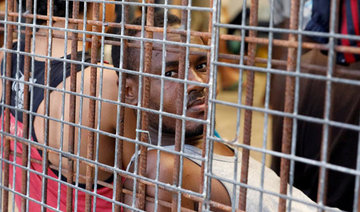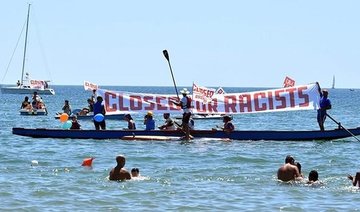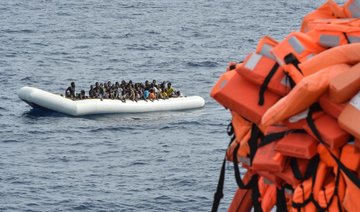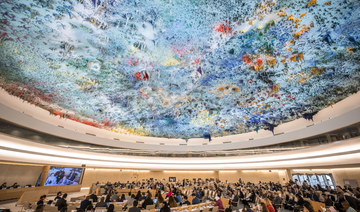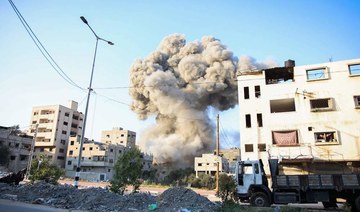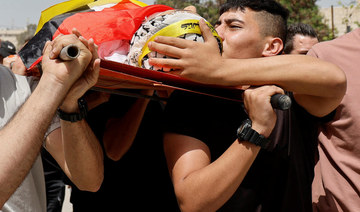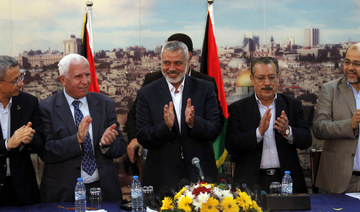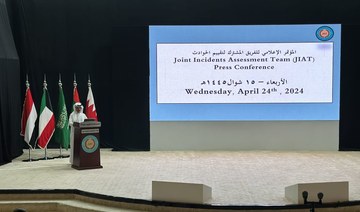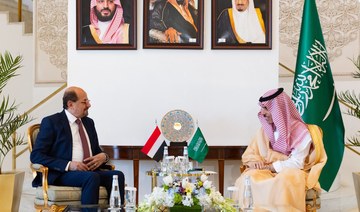CAIRO: Providing resettlement options for illegal migrants trying to reach Europe is unacceptable for many Libyans and could further aggravate the civil conflict there, Libyan sources have said.
However, these sources warned that some warring parties may, for political or financial gains, exploit any proposal to provide migrants and refugees with resettlement options.
Ministers and representatives from 13 European and African countries met on Monday in Bern, Switzerland, to discuss ways to deter illegal immigration, especially through Libya; they also called for improved resettlement options for refugees along the migration route.
“The Libyans fear that Europe will seek to solve its migrant crisis at Libya’s expense through taking advantage of the absence of security and authority in many Libyan territories to provide options that range from establishing camps for detaining or sheltering refugees to resettlement, especially in southern Libya,” said a Libyan media source linked to the illegal immigration issue whose name was withheld for security reasons.
In September 2017, the UN High Commissioner for Refugees (UNHCR) urgently called for resettlement places for 40,000 of the most vulnerable migrants and refugees stranded in 15 countries along the so-called Central Mediterranean route, which includes Libya, Algeria, Tunisia, Morocco, Mali, Sudan, Egypt, Mauritania, Kenya, Burkina Faso, Cameroon, Chad, Djibouti, Ethiopia, and Niger.
In 2016, the UNHCR said that resettlement opportunities were offered to only 6 percent of refugees in the 15 countries, where total needs were estimated to be 277,000.
The representatives of the 13 countries, the Central Mediterranean Contact Group, who held their third meeting this year in Bern, pledged to improve conditions in detention centers in Libya.
“The participants agreed, in close cooperation with Libyan authorities, to develop a system that monitors the situation of migrants and refugees inside detention centers in Libya to improve their conditions and ensure the respect of international human rights and humanitarian standards,” the Swiss Federal Department of Justice and Police said in a statement.
Ministers and representatives of Libya, Algeria, Tunisia, Mali, Niger, Chad, Austria, Italy, Germany, France, Malta, Slovenia and Switzerland signed a “declaration of intent” that included securing priority release from detention of vulnerable refugees and migrants, in particular children and torture victims, as well as supporting authorities and organizations that provide humanitarian assistance to migrants and refugees.
The Contact Group held meetings in Rome in March and in Tunisia in July. The Bern meeting followed the UN’s evacuation of 25 vulnerable Eritrean, Ethiopian and Sudanese refugees from Libya to Niger.
Addressing the Contact Group’s meeting in Bern, the UN High Commissioner for Refugees, Filippo Grandi, said: “The UNHCR hopes to evacuate another 400 extremely vulnerable refugees from Libya before the end of this year.”
On Tuesday the UN Human Rights chief, Zeid Ra’ad Al-Hussein, said: “The suffering of migrants detained in Libya is an outrage to the conscience of humanity,” describing the situation as “catastrophic.”
Al-Hussain said that the monitoring system revealed a rapid deterioration of the migrants’ situation in Libya.
From Nov. 1 to 6, UN human rights monitors visited four Department of Combating Illegal Migration facilities (detention centers) in the Libyan capital, Tripoli, where they interviewed detained migrants and refugees.
Al-Hussain attacked Europe’s policy of helping Libyan authorities to intercept people trying to cross the Mediterranean and returning them to prisons as “inhuman.”
“The international community cannot continue to turn a blind eye to the unimaginable horrors endured by migrants in Libya and pretend that the situation can be remedied only by improving conditions in detention,” he said.
Divergent European stances
“There are many people with divergent views on the matter,” said the Swiss justice minister, Simonetta Sommaruga, emphasizing that despite this, all had vowed to improve the conditions of migrants and refugees, especially in Libya.
Libyan writer and journalist Omar Al-Kadi said that the Libyan authorities’ lack of financial resources is the main cause of poor conditions for detained migrants, but said that European approaches to deterring illegal immigration were not united.
He said that while some European countries’ stances were based on their commitment to human rights principles, as in the case of Switzerland, others, especially Italy, were motivated by their desire to rid themselves of the illegal immigration problem.
He said the Italian government had bribed human smugglers in western Libya to stop smuggling refugees and migrants to the Italian coast without caring for their fate or how this policy would aggravate the civil conflict between different parties in Libya.
Several international media reports referred to a secret deal between the Italian interior minister, Marco Minetti, and Ahmed Ahmed Al-Dabbashi (nicknamed Al-Amo), a human trafficking and smuggling leader in Sabratha, 70 km west of Tripoli, which grants him $5 million every three months to stop migrant boats headed for the coast of southern Italy.
Al-Dabbashi’s group, an armed militia of 500 militiamen, controls three main detention camps for illegal migrants in western Libya and has been repeatedly mentioned in UN and EU reports as one of the main human smuggling and trafficking groups in Libya.
The number of illegal immigrants arriving in Italy dropped by almost 80 percent in July and August 2017, but these numbers quickly rocketed after news of the deal sparked a major conflict to gain influence over the city of Sabratha, which ended with the ousting of Al-Dabbashi’s group.
Omar Al-Kadi said that containing smuggling groups could not be achieved without increasing reconciliation efforts inside Libya, as well as re-establishing the state and restoring its authority.
He criticized any further European attempts to take advantage of the chaos in Libya to achieve their interests, saying this would only worsen the situation in Libya and threaten its unity and security as well as the security of the eastern Mediterranean region.
And an anonymous Libyan media source stressed that the situation of illegal migrants inside Libya could not be improved without real efforts to restore the Libyan state and secure its authority over the whole country.
He cast doubt on any European efforts to deter illegal immigration through operating inside Libya, as seen in the recent meeting in Bern. “If nothing is done to improve the political, economic and security situation in the countries exporting migrants in sub-Saharan Africa, any efforts to deter human trafficking in the Libyan desert will be exceedingly absurd,” he said.
The 13 countries committed to facilitate procedures for voluntary return, develop alternatives to illegal immigration and combat human trafficking through pilot projects that provide Africans with legal access to Europe such as scholarships and apprenticeship programs.
According to the International Organization for Migration (IOM), about 156,000 migrants and refugees have arrived in Europe by sea since January 2017 (compared to 341,000 in the same period in 2016). Italy has received 73 percent of the migrants since the beginning of 2017, while 3,000 died crossing the sea.
Omar Al-Kadi said that the interim Libyan government, the House of Representatives and the Haftar-led Libyan National Army were indifferent to the outcomes of the Bern meeting. “The illegal immigration problem is more concentrated in western Libya than in eastern Libya,” he said.
“The distance between the eastern coast of Libya and Europe makes it unsuitable for human smuggling activities, unlike the western coast of Libya, which is very close to Italy and Malta,” he said. “The Libyan National Army is not present in the main smuggling areas in western Libya and therefore the army is not concerned with any measures taken in this regard, at least at the current stage.”
The anonymous Libyan media source said: “The interim government and the House of Representatives reject these agreements signed by the Government of National Accord in Tripoli and deem them an attack on Libya’s sovereignty.”
“The two conflicting parties’ presence in southern and southwestern Libya is very weak, and therefore any real effort to control the border in those regions cannot be achieved through Libya’s neighboring countries,” he said, emphasizing that the task would be very difficult.
Concerns over Europe seeking to solve its migrant crisis at Libya’s expense
Concerns over Europe seeking to solve its migrant crisis at Libya’s expense
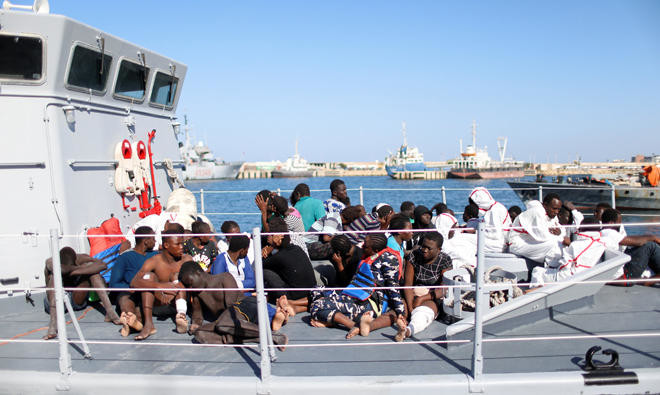
Lebanon moves toward accepting ICC jurisdiction for war crimes on its soil
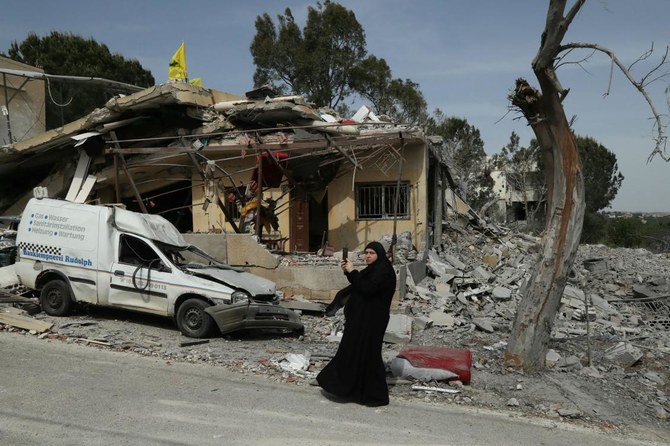
- Neither Lebanon nor Israel are members of the ICC
- Filing a declaration to the court would grant it jurisdiction to investigate and prosecute relevant crimes in a particular period
BEIRUT: Lebanon has moved toward accepting the International Criminal Court’s jurisdiction to prosecute violations on Lebanese territory since October, in what Human Rights Watch said on Saturday was a “landmark step” toward justice for war crimes.
Lebanon has accused Israel of repeatedly violating its sovereignty and committing breaches of international law over the last six months, during which the Israeli military and Lebanese armed group Hezbollah have traded fire across Lebanon’s southern border in parallel with the Gaza War.
That cross-border shelling has killed at least 70 civilians, including children, rescue workers and journalists, among them Reuters visuals reporter Issam Abdallah, who was killed by an Israeli tank on Oct. 13, a Reuters investigation found.
Lebanon’s caretaker cabinet voted on Friday to instruct the foreign affairs ministry to file a declaration with the ICC accepting the court’s jurisdiction to investigate and prosecute crimes committed on Lebanese territory since Oct. 7.
The decree also instructed the foreign ministry to include in its complaints about Israel to the United Nations a report prepared by the Netherlands Organization for Applied Scientific Research (TNO), an independent research institute.
That report looked specifically into Abdallah’s killing, and was produced by examining shrapnel, flak jackets, a camera, tripod and a large piece of metal that were gathered by Reuters from the scene, as well as video and audio material.
Neither Lebanon nor Israel are members of the ICC, which is based in The Hague. But filing a declaration to the court would grant it jurisdiction to investigate and prosecute relevant crimes in a particular period.
Ukraine has twice filed such declarations, which allowed for the court to investigate alleged Russian war crimes.
“The Lebanese government has taken a landmark step toward securing justice for war crimes in the country,” said Lama Fakih, Middle East and North Africa director at Human Rights Watch, urging the foreign minister to “swiftly” formalize the move by filing a declaration to the ICC.
“This is an important reminder to those who flout their obligations under the laws of war that they may find themselves in the dock,” Fakih said.
British troops may be tasked with delivering Gaza aid, BBC report says
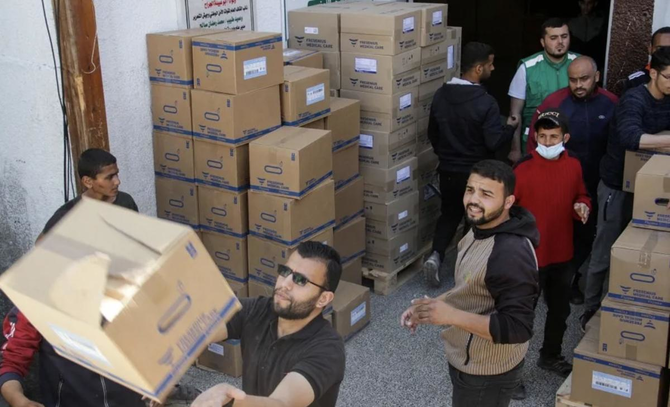
- Britain is already providing logistical support for construction of US pier, including a Royal Navy ship that will house hundreds of American soldiers
LONDON: British troops may be tasked with delivering aid to Gaza from an offshore pier now under construction by the US military, the BBC reported Saturday. UK government officials declined to comment on the report.
According to the BBC, the British government is considering deploying troops to drive the trucks that will carry aid from the pier along a floating causeway to the shore. No decision has been made and the proposal hasn’t yet reached Prime Minister Rishi Sunak, the BBC reported, citing unidentified government sources.
The report comes after a senior US military official said on Thursday that there would be no American “boots on the ground” and another nation would provide the personnel to drive the delivery trucks to the shore. The official, who spoke to reporters on condition of anonymity to discuss details not yet made public, declined to identify the third party.
Britain is already providing logistical support for construction of the pier, including a Royal Navy ship that will house hundreds of US soldiers and sailors working on the project.
In addition, British military planners have been embedded at US Central Command in Florida and in Cyprus, where aid will be screened before shipment to Gaza, for several weeks, the UK Ministry of Defense said on Friday.
The UK Hydrographic Office has also shared analysis of the Gaza shoreline with the US to aid in construction of the pier.
“It is critical we establish more routes for vital humanitarian aid to reach the people of Gaza, and the UK continues to take a leading role in the delivery of support in coordination with the US and our international allies and partners,” Defense Secretary Grant Shapps said in a statement.
Development of the port and pier in Gaza comes as Israel faces widespread international criticism over the slow trickle of aid into the Palestinian territory, where the United Nations says at least a quarter of the population sits on the brink of starvation.
The Israel-Hamas began with a Hamas-led attack into southern Israel on Oct. 7, in which militants killed around 1,200 people, mostly civilians, and took some 250 people as hostages. Israel says the militants are still holding around 100 hostages and the remains of more than 30 others. Since then, more than 34,000 Palestinians have been killed in Israel’s air and ground offensive, according to the Health Ministry in Hamas-run Gaza, around two-thirds of them children and women.
Israeli soldiers kill two Palestinian gunmen in West Bank, military says
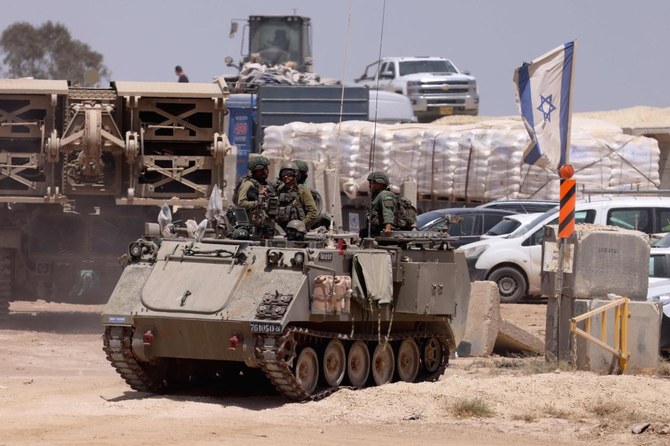
- Violence has been on the rise as Israel presses its attacks and bombardment in Gaza
RAMALLAH, West Bank: Israeli soldiers killed two Palestinian gunmen who opened fire at them from a vehicle in the occupied West Bank, the military said on Saturday.
The military released a photo of two automatic rifles that it said were used by several gunmen to shoot at the soldiers, at an outpost near the flashpoint Palestinian city of Jenin.
The official Palestinian news agency Wafa said security officials confirmed two deaths and the health ministry said two other men were wounded.
There was no other immediate comment from Palestinian officials in the West Bank, where violence has been on the rise as Israel presses its war against Palestinian militant group Hamas in Gaza.
Israel launched its offensive in Gaza after Hamas led an attack on southern Israel on Oct. 7 in which 1,200 people were killed and 253 taken hostage. More than 34,000 Palestinians have since been killed and most of the population displaced.
Violence in the West Bank, which had already been on the rise before the war, has since flared with stepped up Israeli raids and Palestinian street attacks.
The West Bank and Gaza, territories Israel captured in the 1967 war, are among the territories which the Palestinians seek for a state. US-brokered peace talks collapsed a decade ago.
Hamas says it received Israel’s response to its ceasefire proposal
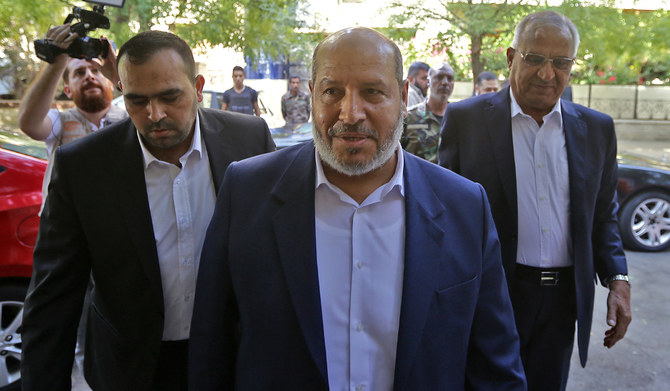
- White House national security adviser Jake Sullivan said on Friday he saw fresh momentum in talks to end the war and return the remaining hostages
- Israel has killed more than 34,000 Palestinians in Gaza, mostly women and children, according to the health ministry in the Hamas-run territory
CAIRO: Hamas said it had received on Saturday Israel’s official response to its latest ceasefire proposal and will study it before submitting its reply, the group’s deputy Gaza chief said in a statement.
“Hamas has received today the official response of the Zionist occupation to the proposal presented to the Egyptian and the Qatari mediators on April 13,” Khalil Al-Hayya, who is currently based in Qatar, said in a statement published by the group.
After more than six months of war with Israel in Gaza, the negotiations remain deadlocked, with Hamas sticking to its demands that any agreement must end the war.
An Egyptian delegation visited Israel for discussion with Israeli officials on Friday, looking for a way to restart talks to end the conflict and return remaining hostages taken when Hamas fighters stormed into Israeli towns on Oct. 7, an official briefed on the meetings said.
The official, who spoke on condition of anonymity, said Israel had no new proposals to make, although it was willing to consider a limited truce in which 33 hostages would be released by Hamas, instead of the 40 previously under discussion.
On Thursday, the United States and 17 other countries appealed to Hamas to release all of its hostages as a pathway to end the crisis.
Hamas has vowed not to relent to international pressure but in a statement it issued on Friday it said it was “open to any ideas or proposals that take into account the needs and rights of our people.”
However, it stuck to its key demands that Israel has rejected, and criticized the joint statement issued by the USand others for not calling for a permanent ceasefire and the withdrawal of Israeli forces from Gaza.
White House national security adviser Jake Sullivan said on Friday he saw fresh momentum in talks to end the war and return the remaining hostages.
Citing two Israeli officials, Axios reported that Israel told the Egyptian mediators on Friday that it was ready to give hostage negotiations “one last chance” to reach a deal with Hamas before moving forward with an invasion of Rafah, the last refuge for around a million Palestinians who fled Israeli forces further north in Gaza earlier in the war.
Meanwhile, in Rafah, Palestinian health officials said an Israeli air strike on a house killed at least five people and wounded others.
Hamas fighters stormed into Israeli towns on Oct. 7, killing 1,200 people and capturing 253 hostages. Israel has sworn to annihilate Hamas in an onslaught that has killed more than 34,000 Palestinians.
Yemen’s Houthis say their missile hit Andromeda Star oil ship in Red Sea
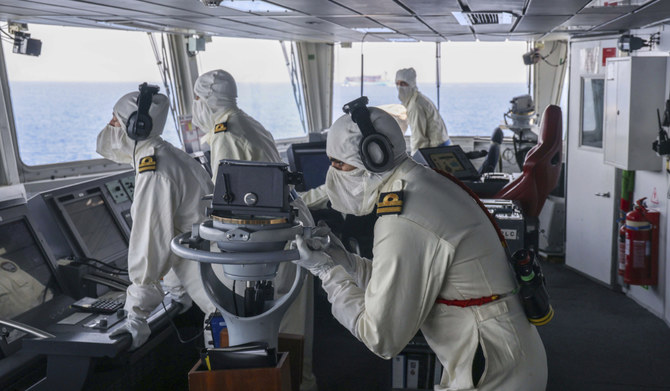
- US military confirmed that the Houthis launched three anti-ship ballistic missiles but caused minor damage to the ship
- A missile landed in the vicinity of a second vessel, the MV Maisha, but it was not damaged, US Centcom said on social media site X
CAIRO/LOS ANGELES: Yemen’s Houthis said on Saturday their missiles hit the Andromeda Star oil tanker in the Red Sea, as they continue attacking commercial ships in the area in a show of support for Palestinians fighting Israel in the Gaza war.
US Central Command confirmed that Iran-backed Houthis launched three anti-ship ballistic missiles into the Red Sea from Yemen causing minor damage to the Andromeda Star.
The ship’s master reported damage to the vessel, British maritime security firm Ambrey said.
A missile landed in the vicinity of a second vessel, the MV Maisha, but it was not damaged, US Central Command said on social media site X.
Houthi spokesman Yahya Sarea said the Panama-flagged Andromeda Star was British owned, but shipping data shows it was recently sold, according to LSEG data and Ambrey.
Its current owner is Seychelles-registered. The tanker is engaged in Russia-linked trade. It was en route from Primorsk, Russia, to Vadinar, India, Ambrey said.
Iran-aligned Houthi militants have launched repeated drone and missile strikes in the Red Sea, Bab Al-Mandab Strait and Gulf of Aden since November, forcing shippers to re-route cargo to longer and more expensive journeys around southern Africa and stoking fears the Israel-Hamas war could spread and destabilize the Middle East.
The attack on the Andromeda Star comes after a brief pause in the Houthis’ campaign that targets ships with ties to Israel, the United States and Britain.
The USS Dwight D. Eisenhower aircraft carrier sailed out of the Red Sea via the Suez Canal on Friday after assisting a US-led coalition to protect commercial shipping.
The Houthis on Friday said they downed an American MQ-9 drone in airspace of Yemen’s Saada province.


